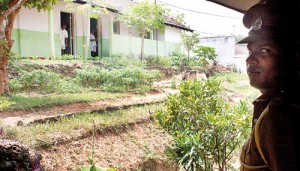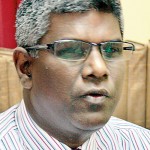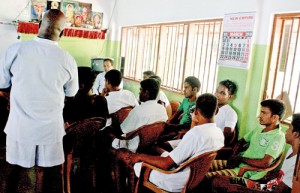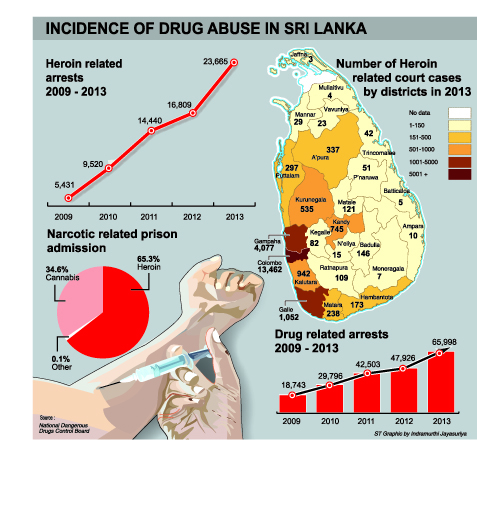News
Drug dependents crying out for rehab centres and counsellors
Many of the nearly 300,000 drug dependents, mostly young and male, yearn to get their lives back, but there is a shortage of full-time counsellors and rehabilitation centres within the community and in prisons.

Inmates take great pride in the vegetables they have planted in the garden surrounding the ward. Pix by Athula Devapriya and Anuradha Bandara
The National Dangerous Drugs Control Board, the competent authority, estimates there

Medical Officer Dr. J.K. Malwattage
are between 45,000 and 50,000 heroin users, and 250,000 cannabis addicts in the country. The board acknowledges there is a shortage of counsellors.
Prisons officials also say the lack of full-time counsellors and facilities remain constraints to rehabilitation work.
Besides, they say that repeat offenders are at risk of being exposed to hard core criminals, although drug dependents are held apart from the main prison populations.
At Mahara Prison where drug dependents are rehabilitated, we met a few young men eager to reclaim their lives.
One of them, Nuwan, is part of a group of 30 being rehabilitated in a three-month programme from the end of this month. He spoke to us as his prison friend Sandaruwan, 20, sang a song that implores Mother to forgive. A fellow inmate played a conga and others joined in clapping along to the beat. Some were

Religious activities are part of the rehab programme
moved to tears.

Thusitha Uduwara, Superintendent of the Mahara Prison
Many in the group being rehabilitated are in their 20s and 30s. They are separated from the main prison population and placed in a medical ward of the prison hospital during rehab.
Sisira Kumara, 29, from Katunayake, is a first time offender, determined to overcome drugs and believes counselling helps.
Nuwan from Embilipitiya, a 34year-old drug addict serving two years for possession of narcotics, is completing his jail term this week. “I will leave as a good man,’’ he promises. He tells us he struggled with addiction and could not even care for his family. Now, he plans to start farming when he returns home.
Thusitha Uduwara, Superintendent of the Mahara Prison said a programme initiated in September last year has rehabilitated 60 inmates so far and only three have re-offended. The rehab project is supported by Amadyapa Sabha (Temperance Movement).

N.K. Gunewardena a counsellor
Mr. Uduwara said dug dependents re-offend and return to jail.
“This was the reason for initiating a rehabilitation programme. Our prison houses large scale and small scale drug  dealers. Because of this we found it essential to keep those being treated away from them.’’ Addicts should not be exposed to drug peddlers, he added.
dealers. Because of this we found it essential to keep those being treated away from them.’’ Addicts should not be exposed to drug peddlers, he added.
Specialised rehab centres offering counselling and other activities are desperately needed, he said.
Latest available data from 2013 show that prisons treated 106 drug dependents, while 1,033 were treated at state run facilities. NGOs rehabilitated 225.
At Mahara, an average of 17 persons are remanded every day and 14 of them are related to narcotics.
“Prisons have to follow court procedures, implement orders given by courts and rehabilitation in general. Drug dependents should be kept away from other criminals and peddlers,’’ Mr. Uduwara said. If they are not separated, they could fall prey to convicts who manipulate them to commit crimes ranging from drug trafficking and burglary to murder, he said. “In some cases they are handed over to agents, who use drug addicts for construction work.’’
Mr. Uduwara said counselling is most needed when drug dependents show “signs of despair and frustration’’ in the early stages. Those being treated also need to eat more and they are served extra compared with other prisoners, he explained.In the prison hospital medical ward, rehab includes counselling and daily workouts from 5:30 a.m. to 8:00 p.m. There are religious activities, sports, music, peer discussions and sharing sessions. Inmates also take great pride in the fruit trees and vegetables they have planted in the garden surrounding the ward.
The National Dangerous Drugs Control Board supports the prison rehab programme and the facility also pulls in counsellors from nearby police stations.
The Mahara prison has six in-house rehabilitation officers including. N.K. Gunewardena, who counsels inmates in a classroom-like setting.
Medical Officer Dr. J.K. Malwattage said usually rehab failed because human and physical resources are not adequate. Support and commitment from government agencies are lacking.
“Most of them have been abandoned, ignored and not wanted by their families. Therefore, they need a lot of counselling. We also provide family counselling. However, there is a need of more counsellors and facilities,” he said.
The prevalence of infectious diseases such as tuberculosis is high among drug dependents and blood-borne diseases are common among those who inject drugs by sharing syringes, he said.
Dr. Malwattage points out the futility of arresting drug addicts by police simply because parents and people in the neighbourhood want them out of sight. Addicts return to the same environments after a couple of months, he said.
National Dangerous Drugs Control Board, Chairman Dr. N. Samarasinghe says there is a severe shortage of qualified counsellors in narcotic addiction therapy. The board estimates that there are between 45,000 and 50,000 heroin addicts, and 250,000 cannabis addicts.
“We need full time counsellors. Prisons officers are trained as part time counsellors, but it won’t be a success if they are not released to be full time officers. Prisoners are also reluctant to have jailors or prisons officials as counsellors and request for outsiders,” he said.
“Prison hospitals should always be separate from prisons. Medical officers attached to hospitals should be able to treat their patients not taking into consideration whether they are murderers or rapists. Similarly, rehabilitation of drug dependents should be done in a special centre. They should be seen not as offenders but as patients,” he added.
Dr Samarasinghe underlines the need to establish more recognised rehabilitation centres, with civil society and religious leaders playing a more active role.
There are plans to use Boossa and Kandakaduwa as drug rehabilitation centres.
He said that at Kompannaveediya in Colombo, more than 350 drug addicts were found to be using syringes to inject heroin. When drugs are scarce, several addicts share a small amount using syringes. “We are conducting awareness among the people in the area on HIV and Hepatitis,” he said.
Those infected with Hepatitis B and C may end up with liver diseases such as cirrhosis and liver cancer. These diseases can cause death.
Dr. Samarasinghe said law enforcement needs to change its attitude towards drug addicts. He referred to a recent court ruling in which police were warned against arresting drug dependents by planting small quantities of drugs on them.
In terms of prison admissions, narcotics offences top the list, followed by illegal liquor.
“Out of the total prisoners 65 percent take drugs and out of that 40 percent were arrested over direct links to narcotics, while 25 percent are other crimes triggered by drug addiction,” Dr Samarasinghe said.
Heroin accounts for 65.3 per cent of the narcotic drugs related prison admissions, followed by cannabis, which represents 34.6 per cent.
As for arrests, latest available statistics from 2013 show that police account for 95.8 per cent, followed by the Excise Department and the Police Narcotics Bureau.
In 2013, police arrested 22,600. The Department of Excise arrested 504 and PNB made 303 arrests.
A senior police official said that law enforcers do work with NDDCB rehabilitation centres and assist in prison rehab programs, while bearing in mind the responsibility to maintain law and order. “Drug addicts get involved in many other crimes. Action has to be taken against them.’’
The former head of Police Narcotics Bureau, Anton Jeyananthan sees the need for a drug intelligence unit and take down drug kingpins to stem the flow of narcotics into communities.
“Local police should keep their areas clean while the PNB should strengthen their intelligence gathering to arrest drug lords. A reward and punishment scheme should be introduced. Police officers should not be placed in one area for more than five years,” he said.
He does not favour imprisoning first offenders and suggests post-rehab programmes for those who have turned their lives around.
All those who spoke to us agree that drug dependents deserve more support to become good humans again and that punitive laws are not the only answer.

